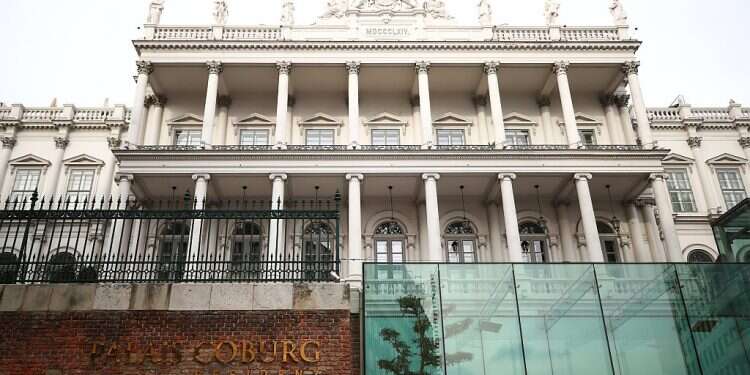Israel on Thursday urged world powers to halt nuclear talks with Iran immediately, citing a UN watchdog's announcement that Tehran has started producing enriched uranium with more advanced centrifuges.
Follow Israel Hayom on Facebook and Twitter
"Iran is carrying out nuclear blackmail as a negotiating tactic, and this should be answered by the immediate halt to negotiations and the implementation of tough steps by the world powers," Prime Minister Naftali Bennett's office quoted him as saying in a call with US Secretary of State Antony Blinken.
The International Atomic Energy Agency (IAEA) said on Wednesday that Iran had started the process of enriching uranium to up to 20% purity with one cascade, or cluster, of 166 advanced IR-6 machines at its Fordo plant, dug into a mountain.
An Israeli official said Bennett told Blinken of his objections to any lifting of sanctions against Iran, particularly under an interim deal, which would effectively mean "the massive flow of funds to the Iranian regime."
Under the 2015 deal, no uranium enrichment is supposed to be carried out at Fordo at all. Until now Iran had been producing enriched uranium there with IR-1 machines and had enriched with some IR-6s without keeping the product.
Several hours after Israel called on world powers to end the talks in the Austrian capital, Iran's Foreign Ministry hit back.
"As #ViennaTalks advances, Israeli regime shows its true color again, calling for immediate halt of negotiations. Not surprising. Dialogue is always despised by the regime whose genesis is based on war, tension & terror. Delegates in Vienna won't take instruction from Beit Aghion," the ministry spokesperson, Saeed Khatibzadeh, tweeted, referring to the official name for the Prime Minister's Residence rather than mention Israel.
Iran on Wednesday accused Israel of "trumpeting lies to poison" the Vienna talks on reviving Tehran's 2015 nuclear agreement with major powers, even as the UN nuclear watchdog said Tehran had started producing enriched uranium with more efficient advanced centrifuges at its Fordo plant dug into a mountain.
"Israeli regime whose existence relies on tension is at it again, trumpeting lies to poison Vienna talks," Khatibzadeh tweeted without specifying what Israeli comments he meant.
"All parties in the room now face a test of their independence & political will to carry out the job – irrespective of the fake news designed to destroy prospects for success," he added.
Israeli regime whose existence relies on tension is at it again, trumpeting lies to poison Vienna talks.
All parties in the room now face a test of their independence & political will to carry out the job— irrespective of the fake news designed to destroy prospects for success.
— Saeed Khatibzadeh | سعید خطیبزاده (@SKhatibzadeh) December 1, 2021
While it was unclear what news reports Khatibzadeh meant, a Tel Aviv-based reporter for US news organization Axios on Monday reported Israel had shared intelligence over the past two weeks with the United States and several European allies suggesting that Iran was taking technical steps to prepare to enrich uranium to 90% purity, the level needed for a nuclear weapon.
The International Atomic Energy Agency's announcement, meanwhile, appeared to at least partially corroborate those intelligence reports and undercut indirect talks between Iran and the United States on bringing both fully back into the battered deal that resumed this week after a five-month break prompted by the election of hard-line President Ebrahim Raisi.
Western negotiators fear Iran is creating facts on the ground to gain leverage in the talks.
On the third day of this round of talks, the IAEA said Iran had started the process of enriching uranium to up to 20% purity with one cascade, or cluster, of 166 advanced IR-6 machines at Fordo. Those machines are far more efficient than the first-generation IR-1.
Underlining how badly eroded the deal is, that pact does not allow Iran to enrich uranium at Fordo at all. Until now the Islamic republic had been producing enriched uranium there with IR-1 machines and had enriched with some IR-6s without keeping the product.
It has 94 IR-6 machines installed in a cascade at Fordo that is not yet operating, the IAEA said in a statement.
A more comprehensive IAEA report circulated to member states and seen by Reuters said that as a result of Iran's move the nuclear watchdog planned to step up inspections at the Fordo Fuel Enrichment Plant that houses the centrifuges, but the details still need to be ironed out.
Iran played down the report as routine despite the fact that the IAEA, which does not explicitly give a reason for such reports, typically issues them only for significant developments such as fresh breaches of the deal's nuclear restrictions.
"The recent report of the IAEA on Iran's nuclear activities, is an ordinary update in line with regular verification in Iran," Iran's permanent mission to the UN organizations in Vienna said on Twitter.
Subscribe to Israel Hayom's daily newsletter and never miss our top stories!




